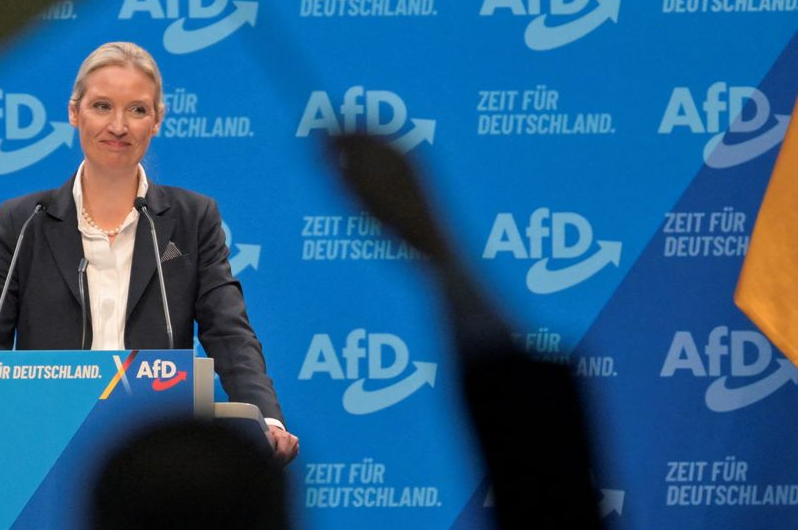Introduction
The far-right Alternative for Germany (AfD) has taken a bold step by electing its first-ever chancellor candidate, signaling a new chapter in German politics. This move underlines the party’s growing influence and ambitions, raising critical questions about its impact on Germany’s democratic landscape. As the AfD’s popularity surges in polls, the broader implications of its rise extend far beyond Germany, challenging the very foundations of European unity and values.
Key Takeaways
1. AfD Elects Chancellor Candidate:
The far-right AfD has chosen its first-ever candidate for chancellor, signaling its intent to challenge mainstream political norms.
2. Growing Popularity in Polls:
Once considered a fringe party, the AfD is now polling as Germany’s second most popular political force, highlighting a significant shift in voter sentiment.
3. A Platform Rooted in Division:
The AfD’s policies focus on anti-immigration, Euroscepticism, and nationalism, resonating with voters frustrated by globalization and mainstream politics.
4. Political and Social Backlash:
The AfD’s rise has drawn widespread criticism from civil society, political leaders, and activists who view the party as a threat to Germany’s democratic values.
5. Broader Implications for Europe:
The AfD’s momentum reflects a wider trend of rising far-right influence across Europe, with potential consequences for EU integration and cooperation.
AfD’s First Chancellor Candidate: A Bold Move
For the first time in its history, the AfD has positioned itself to directly compete for the highest political office in Germany by electing a chancellor candidate. This decision is more than symbolic—it represents the party’s growing confidence and its desire to transition from protest politics to governing.
The candidate’s identity and rhetoric are emblematic of the party’s core values: opposition to immigration, skepticism of the EU, and a staunch nationalist agenda. By presenting a unified front, the AfD aims to solidify its support base and attract disillusioned voters from across the political spectrum.
The Surge in Popularity
The AfD’s rise in the polls is nothing short of remarkable. Once relegated to the fringes of German politics, the party is now Germany’s second most popular political force, according to recent surveys. This growth is driven by several factors, including dissatisfaction with the government’s handling of immigration, economic challenges, and a perceived disconnect between elites and everyday citizens.
The AfD has successfully capitalized on these frustrations, using divisive rhetoric to galvanize support. Its messaging often blurs the line between populism and extremism, creating a potent mix that appeals to a wide range of voters.
Opposition and Backlash
Despite its growing popularity, the AfD remains a deeply polarizing force. Critics argue that its platform undermines Germany’s democratic principles and fosters division within society.
Civil society organizations, political leaders, and activists have raised alarms about the party’s impact on social cohesion. Protests against the AfD are common, with many Germans viewing the party’s rise as a dangerous step backward, reminiscent of darker chapters in the country’s history.
Implications for Europe
The AfD’s success is not an isolated phenomenon. Across Europe, far-right parties are gaining traction, reflecting a broader trend of disillusionment with traditional politics. In countries like Italy, France, and Hungary, nationalist and Eurosceptic movements are reshaping the political landscape.
For the European Union, the AfD’s rise poses a significant challenge. A stronger AfD presence in German politics could disrupt EU integration efforts, particularly in areas like migration policy and climate initiatives. It also emboldens other far-right parties, potentially shifting the balance of power in Europe toward more insular and nationalist policies.
Opinion: A Test for German Democracy
In my view, the AfD’s emergence as a major political player is a critical test for Germany’s democratic resilience. While the party’s rise reflects genuine frustrations within the electorate, its platform and rhetoric risk deepening divisions and undermining the values that have defined post-war Germany.
This moment calls for introspection and action—not just from Germany’s political establishment, but from society as a whole. Addressing the root causes of voter dissatisfaction, from economic inequality to concerns about immigration, is essential to countering the AfD’s appeal.
Democracy thrives on debate and diversity of opinion, but it also requires a commitment to shared values of tolerance, inclusion, and human rights. The AfD’s rise challenges these principles, making it more important than ever for Germany to reaffirm its commitment to these ideals.
Conclusion
The AfD’s election of a chancellor candidate marks a turning point in German politics, signaling the party’s ambitions to move from the fringes to the center of power. As the party gains ground in polls, the implications for Germany and Europe are profound. This is not just a political moment—it’s a societal one, with lasting consequences for democracy, unity, and the future of Europe.
#Germany
Source – sky.com: As the AfD Elects Its Chancellor Candidate, the Far-Right Party Looms Large Over German Politics










